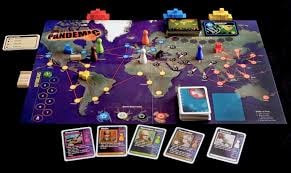How Board Games Enhance Emotional Intelligence and Social Reasoning Skills
Zeba ParkarShare
Board games have been part of human culture for centuries, yet their worth is much more than amusement. They influence our emotional intelligence and social logic, turning us into more empathetic, strategic, and resourceful individuals in real life.
As a gamer, analyst, and onlooker of board games' influence on people of various ages, I can confidently affirm that board games are serious means of personal development. They compel players to acquire emotional intelligence skills, hone critical thinking, and effectively navigate social interactions.
Let us see how playing board games enables players of all ages to improve their cognitive functions, make better decisions, and cultivate empathy—all while enjoying themselves.
The Connection Between Board Games and Emotional Intelligence
What Is Emotional Intelligence, and Why Does It Matter?
In the current world of rapid changes, emotional intelligence (EI) is crucial in navigating personal and professional environments. Emotional intelligence is the capacity to know, understand, and manage one's own emotions, as well as be sensitive to others' emotions. It enables people to control their emotions in positive ways, communicate effectively, and establish strong relationships.
Emotional intelligence is as essential as cognitive intelligence (IQ) in determining one’s success in life. People with high EI tend to:
- Handle conflicts better in personal and professional life, leading to healthier relationships and more effective problem-solving.
- Make better decisions under pressure, as they are less likely to let emotions cloud their judgment.
- Exhibit higher levels of empathy and social awareness, making it easier to understand and connect with others.
- Form stronger, more meaningful relationships, which are key to both personal happiness and professional success.
Here, board games are not merely entertainment—they provide a controlled, low-risk setting that can really boost one's emotional intelligence. Through the diverse experiences provided by board games, players learn to manage their emotions and develop self-awareness, self-regulation, empathy, and social skills. Whether playing a casual game night or competing in a high-stakes tournament, board games expose players to a wide spectrum of emotions and assist them in developing these crucial emotional skills.
1. Experiencing and Managing Emotions in a Safe Environment
In everyday life, emotional reactions can have a permanent impact—both positive and negative. Nevertheless, during board games, players are given a safe environment to feel, process, and manage emotions without far-reaching consequences. The range of emotions which occur in a game, for example, anticipation, frustration, excitement, and disappointment, provide ideal conditions for emotional learning.
During a game, players might experience:
- The anticipation of an opponent’s move: This excitement and suspense encourage players to manage anxiety and stay focused.
- The frustration of an unexpected setback: Whether it’s a bad roll of the dice or an opponent’s unexpected move, frustration is a natural reaction. The challenge is to stay calm and think critically.
- The excitement of executing a winning strategy: When things go well, players experience joy and a sense of accomplishment, teaching them to appreciate their achievements.
- The disappointment of a last-minute defeat: Losing a game, especially after putting in significant effort, can lead to feelings of disappointment and frustration. It’s a valuable opportunity to practice emotional control.
Every one of these emotional experiences offers players the chance to work through their emotions, consider their responses, and learn how to deal with them in similar situations in the future. Because board games are based on well-defined rules and consequences, players can learn to deal with emotional highs and lows in a controlled environment without the threat of real-world consequences. This can improve a person's ability to regulate their emotions and build a more resilient attitude over time.
2. Building Resilience, Patience, and Emotional Control
Resilience, patience, and self-control are central components of emotional intelligence, and board games are a great source for learning all of these skills. Resilience is the capacity to recover from misfortunes, and board games offer limitless opportunities to encounter failures as well as success. Players have to go through challenges, make risky decisions, and alter their approaches as the game progresses.
In any competitive board game, there will be winners and losers. For example, if a player loses a critical round in a strategy game, they are confronted with two possible responses:
- React emotionally—feeling upset, blaming others, or quitting the game in frustration.
- Regulate their emotions—accepting the setback, learning from it, and focusing on the next steps ahead.
The second choice demands self-discipline and patience—essential building blocks of emotional intelligence. Through learning the art of reacting to failure in board games with serenity and reason, people educate themselves to encounter the same problems in actuality with increased emotional strength. Be it a work-related conflict, academic difficulty, or personal failure, the capacity to keep calm, think, and make rational choices under pressure can be incredibly helpful.
3. Self-Awareness and Emotional Regulation Through Board Games
One of the most important aspects of emotional intelligence is self-awareness—the ability to identify and know one's own emotions. Board games contribute to self-awareness in players by forcing them to identify how they feel at various points throughout the game. Whether frustration at not doing well or elation at carrying out a plan, board games allow players to see their emotional response in the moment.
4. Empathy and Social Skills in Board Games
In addition to self-awareness and emotional regulation, empathy plays a crucial role in emotional intelligence. Empathy is the ability to understand and share the feelings of others. Board games are an excellent way to cultivate empathy, as they require players to pay attention to the emotional states of their fellow participants.
The Long-Term Benefits of Playing Board Games on Emotional Intelligence
Over time, regularly playing board games can help individuals develop a more balanced emotional life. By regularly engaging in emotional challenges, players become more self-aware, more empathetic, and better equipped to regulate their emotions in stressful situations. These skills can enhance personal relationships, boost career success, and increase emotional resilience.
Example: Terra Loop and Emotional Control
In Terra Loop, players race to collect ancient currency while navigating various lands. The game promotes:

- Emotional resilience by overcoming setbacks like losing currency.
- Patience in waiting for the right opportunities.
- Emotional intelligence through managing highs and lows in the game.
It helps build emotional control and adaptability through engaging and challenging gameplay.
The Social Benefits of Playing Board Games
How Social Reasoning Helps in Everyday Life
In all areas of life, from the workplace to the classroom to home, we are always reading social cues and modifying our behavior to suit the occasion. Social reasoning is important in defining the way that we interact with people. Social reasoning enables us to:
- Understand others' views: By comprehending what another person may be experiencing or what they are possibly thinking, we can connect with them better and make communication easier.
- Anticipate responses: Understanding how a person is likely to react in a given situation allows us to handle tough conversations and conflicts more easily.
- Adapt our communication style: Communication is not only about what we communicate, but also how we communicate. Social reasoning enables us to modify our tone, body language, and words based on the individual or group we are communicating with.
Individuals who excel in social reasoning typically:
✔️ Navigate complex social situations with ease, whether in a meeting, a social gathering, or a difficult conversation.
✔️ Communicate effectively with diverse groups of people, considering their backgrounds, emotions, and needs.
✔️ Exhibit high-level empathy and adaptability, which are crucial for creating positive relationships in both personal and professional environments.
In other words, social reasoning is a key skill that helps us understand the world around us, connect with others, and work together toward common goals.
Board Games as a Social Training Ground
Though social reasoning can be applied in real-life scenarios, board games offer a systematic and fun means of cultivating and improving these skills. Board games compel players to have social interactions, both cooperative and competitive, which naturally develops and improves social reasoning skills. Here’s how:
1. Negotiating with Other Players in Cooperative Games
In most cooperative board games, players are working towards a shared objective, with usually limited resources or time, so they have to rely strongly on social reasoning skills. Players need to negotiate roles, assign tasks, and share tools while taking into consideration the others' needs and strengths. Working together helps develop empathy, patience, and social cue reading skills to discern other people's feelings or what they require.
2. Predicting Opponents' Moves in Competitive Games
In competitive board games, players tend to need to anticipate what their opponents will do and modify their strategies based on that. This involves having a good insight into other people's thought processes and being able to foresee reactions. Players have to continuously analyze the state of the game and modify their strategies depending on the way others play.
For instance, in a board game such as Chess, one has to forecast the moves of the opponent, think ahead for a few moves, and prepare accordingly. It not only involves logical thinking but also a good amount of social reasoning, where one has to imagine how the opponent would behave in a certain situation. This element of strategic thinking enables people to hone their decision-making and empathy skills since they start imagining how others might respond to a situation.
3. Following Social Rules While Keeping Your Emotions in Check
Each board game also has its rules that one is required to abide by. Observing these rules may appear easy, but they typically involve the player managing emotions and changing his or her conduct according to circumstance. Such an exercise of controlling one's impulses and staying composed despite pressure is an important element of social reasoning.
4. Strengthening Communication Skills
Effective communication is at the heart of every board game. Whether you’re explaining the rules of the game, negotiating strategies, or responding to opponents’ moves, clear communication is essential for success. Board games provide a safe space to practice both verbal and non-verbal communication skills. Players must not only communicate their thoughts and plans clearly but also read the non-verbal cues of others—body language, facial expressions, and tone of voice— to fully understand the context of a situation.
This type of communication practice in games strengthens social reasoning skills by encouraging players to think critically about how they convey information and how others are likely to interpret it.
Example: Cooperative Board Games and Teamwork
Consider a game like Pandemic, where players work together to stop global outbreaks. This game enhances:
- Collaboration skills as players coordinate their moves.
- Communication skills as they strategize together.
-
Problem-solving skills to find the most efficient solution.

Through shared decision-making, participants develop trust, empathy, and leadership qualities—essential for both personal and professional life.
Another example is Guess the Fence, players secretly build fences on a farm and must guess the locations of others' fences. This game enhances:

- Collaboration as players discuss strategies with teammates.
- Communication skills to share and interpret hints effectively.
- Problem-solving abilities to make informed guesses and plan moves.
Much like Pandemic, Guess the Fence fosters teamwork and trust, while also encouraging creativity and strategic thinking. It’s a great way for players to practice social reasoning, as they anticipate others’ actions and make decisions that affect the group's success.
The Long-Term Benefits of Playing Board Games
How Board Games Prevent Cognitive Decline
Board games are not merely for fun; they provide numerous benefits for people of all ages. From toddlers to seniors, board games are a fun and interactive means of practicing important life skills while promoting social interaction. Whether you want to improve emotional intelligence, increase cognitive function, or just spend quality time with family and friends, board games offer a structured, enjoyable setting in which to do so.
Why Everyone Should Play Board Games
Board games are not just for entertainment; they offer a wide range of benefits for individuals of all ages. From young children to older adults, these games serve as a fun and engaging way to practice essential life skills while fostering social connections. Whether you are looking to boost emotional intelligence, enhance cognitive abilities, or simply enjoy quality time with loved ones, board games provide a structured, enjoyable environment to do so.
Benefits for Different Age Groups:
Children: Develop Emotional Control and Patience
For children, board games are an invaluable tool in building emotional intelligence. Playing these games helps children learn how to regulate their emotions and cope with winning and losing. By waiting for their turn, managing frustration after a defeat, or celebrating a victory, kids can develop emotional control and patience. In the process, they also improve their communication skills, teamwork, and ability to follow rules—all of which are crucial in both academic and social settings.
Adults: Sharpen Problem-Solving and Negotiation Skills
For adults, board games can be a mental workout, enhancing skills like problem-solving, strategic thinking, and negotiation. In games where critical decisions and long-term planning are involved, players exercise their ability to think ahead, analyze situations, and come up with solutions to complex problems. Additionally, many board games require negotiation, fostering collaboration and the ability to persuade or compromise. These are skills that translate directly to the workplace, where navigating conflicts, collaborating with teams, and making informed decisions are everyday tasks.
Elderly Players: Maintain Cognitive Health and Short-Term Memory
Board games are also beneficial for the elderly, helping maintain cognitive health and enhancing short-term memory. Many board games involve recalling rules, remembering past moves, or strategizing several turns ahead, which exercises the brain. This kind of mental stimulation can help slow the effects of aging on memory and problem-solving abilities. Moreover, playing with friends or family encourages social interaction, combating isolation and promoting mental well-being. For older adults, the benefits of board games go beyond mental health—they provide opportunities for bonding and reducing stress.
Conclusion:
Board games offer more than just a fun way to pass the time—they provide a powerful tool to enhance brain development, emotional intelligence, and social skills. Every game requires players to think strategically, make decisions, and engage with others, stimulating the brain in ways that foster growth and learning. Whether it's improving memory, boosting creativity, or teaching patience, the positive effect of playing board games is undeniable.
As a parent, teacher, or simply someone who enjoys a good challenge, incorporating board games into your routine can have a lasting impact on both cognitive and emotional development. The next time you sit down to play, remember that each move you make strengthens your brain and helps you grow into a more effective communicator, problem solver, and empathizer.
Explore ToadBird’s Educational Board Games—designed to develop critical thinking, problem-solving, and social skills while making learning fun!